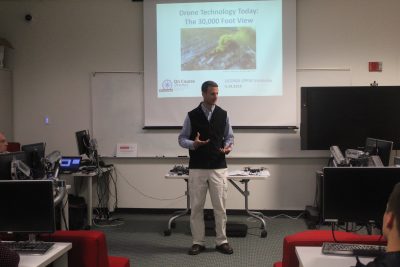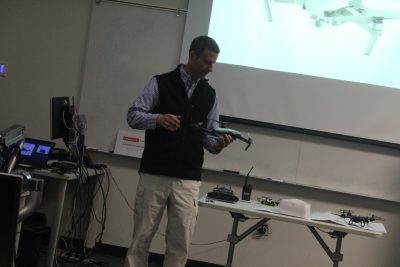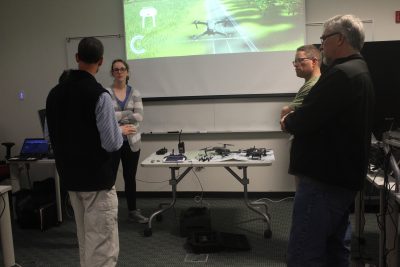 On Friday, April 19th, OPIM Innovate invited Jason Otrin, entrepreneur and founder of On Course Drones, to host its Drones in Action Workshop. The purpose of the workshop was to teach students about the multipurpose benefits of drone technology and the Remote Pilot Certification process. In addition to this, Otrin spoke about why he decided to start his On Course Drones initiative and the entrepreneurial challenges he faced to get there. Overall, the workshop was an insightful look into how a recreational pastime and personal interest can become a successful commercial endeavor.
On Friday, April 19th, OPIM Innovate invited Jason Otrin, entrepreneur and founder of On Course Drones, to host its Drones in Action Workshop. The purpose of the workshop was to teach students about the multipurpose benefits of drone technology and the Remote Pilot Certification process. In addition to this, Otrin spoke about why he decided to start his On Course Drones initiative and the entrepreneurial challenges he faced to get there. Overall, the workshop was an insightful look into how a recreational pastime and personal interest can become a successful commercial endeavor.
After enlisting in the Connecticut Army National Guard in 1990 and serving in aviation maintenance, Otrin enrolled in the UConn Reserve Officers’ Training Corps program. In 1995, he earned a bachelor’s degree in political science and was commissioned as an intelligence officer in the US Army. He was always very interested in aviation and, based on his service with helicopters in the National Guard and exposure to military aviation, earned his private pilot license while serving on active duty. After departing from the army in 2000, he worked for 17 years in information technology (IT) services until he realized, from helping his wife with her own start-up ventures, that he wanted to open his own business. That was when he found UConn’s Entrepreneurship Bootcamp for Veterans, which helped him apply his acquired entrepreneurial acumen to his first business plan.
 “My intention was to start an IT training company,” said Otrin while reminiscing about his business prototyping days. “But, deep down, it wasn’t really what I wanted. One of my mentors helped me realize that. After working on a 45-page business plan for 4 months, she said to me, ‘You know what, I can tell that this isn’t what lights you up.'” She asked Otrin to think about his childhood interests, his hobbies, what he reads, and his pastimes to steer him in the right direction in terms of creating a business he would enjoy running. It didn’t take long for him to pinpoint that he wanted to do something with aviation. “I went to airshows, read aviation magazines, was obsessed with flying–so I came back a week later and told her that I needed to do something aviation related.” Based on how quickly he wrote his second business plan, he realized that following his passions would lead to his success.
“My intention was to start an IT training company,” said Otrin while reminiscing about his business prototyping days. “But, deep down, it wasn’t really what I wanted. One of my mentors helped me realize that. After working on a 45-page business plan for 4 months, she said to me, ‘You know what, I can tell that this isn’t what lights you up.'” She asked Otrin to think about his childhood interests, his hobbies, what he reads, and his pastimes to steer him in the right direction in terms of creating a business he would enjoy running. It didn’t take long for him to pinpoint that he wanted to do something with aviation. “I went to airshows, read aviation magazines, was obsessed with flying–so I came back a week later and told her that I needed to do something aviation related.” Based on how quickly he wrote his second business plan, he realized that following his passions would lead to his success.
Fast forward to today and Otrin now runs a drone training firm that helps clients prepare for the FAA 107 exam, a certification that allows you to fly a remote aircraft (a.k.a a drone) for commercial purposes below 400 feet, along with other requirements. In addition, he takes on private projects related to drones, such as birds-eye-view real estate displays showcasing neighborhood environments, and will be teaching a course at UConn in the fall, OPIM 4895-001, which will give UConn students the opportunity to prepare for the FAA 107 exam for credit. “As part of the course, I want to help students develop an idea of where they want to go with drones. This will be their project,” he explained, “applying drones to their career fields.”
 Outside of recreational use, drones have many practical applications that can be beneficial to various industries. They allow human beings to get to places they may not otherwise be able to go, see things from an overhead perspective, and make informed decisions. For instance:
Outside of recreational use, drones have many practical applications that can be beneficial to various industries. They allow human beings to get to places they may not otherwise be able to go, see things from an overhead perspective, and make informed decisions. For instance:
- Insurance companies use drones before and after natural disasters to assess damage compensation and inform customers about the status of their homes.
- Search and rescue teams use drones to assist injured persons by pinpointing their location and through the transportation of resources.
- Military officers use drones to gain intel on the enemy and assist commanders to assess and decide on next steps.
Alongside these real-world examples, drone technology is becoming far more advanced, meaning that drones are becoming more automated, obstacle-aware and flight time is improving. DJI Mavic 2 Pro can be flown and monitored by its remote, or transmitter, up to 4.9 miles away and stay in the air for 31 minutes. Note that these specifications are under ideal conditions and FAA regulations require drones to stay within visual line of sight of the operator unless they possess a waiver. DJI also manufactures headsets that give drone users a first-person perspective of what the drone is capturing. These headsets typically monitor head movements to adjust camera direction using the drone’s gimbal, a stand that levels the drone’s built-in camera as it flies.
 After the workshop, students left with a better understanding of drones and how they can utilize drone technology in their own pursuits. “I’ve had this idea for a while now to use drones as a way to help commuters find available parking spaces,” said computer science major Andi Duro (’21) when asked about his experience at the workshop. “This workshop gave me a better understanding of the regulations and rules of commercial air flight to help me better solidify that idea.” Natalie Chmielewska (’21), a computer science and engineering double major, also gained useful insight to help her with the UConn SPARK program. “Jason put in a lot of effort to show us every aspect of drone flying and how it can be used for our own pursuits and for those younger than us,” she said. UConn SPARK gives middle school and high school students access to week-long workshops centered around engineering and STEM to encourage their involvement in those areas.
After the workshop, students left with a better understanding of drones and how they can utilize drone technology in their own pursuits. “I’ve had this idea for a while now to use drones as a way to help commuters find available parking spaces,” said computer science major Andi Duro (’21) when asked about his experience at the workshop. “This workshop gave me a better understanding of the regulations and rules of commercial air flight to help me better solidify that idea.” Natalie Chmielewska (’21), a computer science and engineering double major, also gained useful insight to help her with the UConn SPARK program. “Jason put in a lot of effort to show us every aspect of drone flying and how it can be used for our own pursuits and for those younger than us,” she said. UConn SPARK gives middle school and high school students access to week-long workshops centered around engineering and STEM to encourage their involvement in those areas.
OPIM Innovate would like to thank Jason Otrin for his service, both in the military and for the OPIM Department. We look forward to seeing what you do in the fall! A huge thank you to everyone who attended, as well!